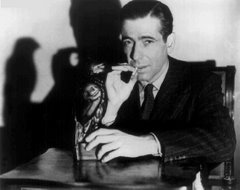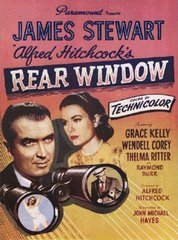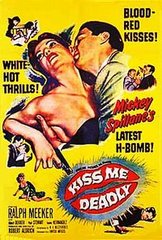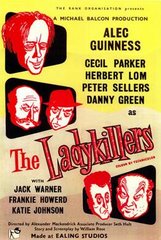Since I am both forgetful and lazy, I didn't enter the
Turner Classic Movies Guest Programmer contest. In a way, it's for the best, since I'm kinda camera shy and would hate to be on television, even if it meant getting my movie choices shown on my favorite channel. But.... if I
were going to be the TCM Guest Programmer, these are the movies I'd pick (and please note, these are not necessarily my all-time favorites -- though one is -- just four movies that I think deserve a wider audience and would make for a night of entertaining TV):

1.)
The Strawberry Blonde (Raoul Walsh, 1941): This is one of the reasons I love the Golden Age of Hollywood. A movie that's simply entertaining, with Cagney, DeHavilland, Carson, and Hayworth all at the top of their game. Funny, romantic, wistful, true to the small and great ironies of life, insightful about human faults and vanities -- simply a well-made and well-told story. It's not an ambitious film like
Citizen Kane or
Gone with the Wind; it's not one of those accidental miracles that resulted in cultural immortality like
Casablanca or
The Wizard of Oz; it's not an iconic film for any of its four stars. And yet at the end of the day, I never get tired of this movie. Every time -- and I mean
every time -- this movie is on television (it's not on DVD... grrrr) I sit and watch it. I think I've seen it close to seven or eight times, and I could watch it a dozen more. It's the epitome of classic studio era movie-making: Nothing spectacular or groundbreaking, simply a really, really good and entertaining movie. Utterly enjoyable.

2.)
Waterloo Bridge (Mervyn LeRoy, 1940): I've never seen the pre-Code original of this one, though I've read many times that that 1931 film is superior. I can only guess it's because the earlier film doesn't refuse to mention the heroine's profession (the oldest one, in this case), and doesn't waste time on any of that dreamy 1940s romanticism. Apparently the older film is better because it's "modern," "grittier," more "sexually frank," more "open" in its subject matter and unwilling to sugarcoat the harsh realities of life. Okay, whatever. Give me lush romance, tragic heroines, candlelit dances, "Auld Lang Syne," and characters who can't bear to utter the scandalous word "prostitute," over some dreary early '30s social drama about a hooker with a heart of brass (and yes, I realize I'm being unfair to a movie I've never seen). I much prefer Vivien Leigh's tragic dancer Myra, whose heartbreak and fatalism lead her to a life of prostitution, than a pre-Code Myra who has always been a prostitute, but who falls in love with a naive boy and wants to change for his sake but knows it's too late, the set-up of so many "a prostitute makes nice" stories. Leigh's Myra is a strange bird, a young girl with no family and ambitions to dance, a beautiful girl who at the same time has a morose quality, an inkling of the possible futility of life, that gives her a deep, complex sadness. Robert Taylor, a man of action, a child of privilege who bounds through life with reckless abandon, and yet he's drawn to the sad, strangely mature, delicately beautiful girl. And of course, it's all heartbreak and ill-fate. I could write pages about this movie, and maybe someday I will. But at least I can share my love with
the Chinese, who apparently love this movie, since it was one of the first American films they were able to see after the war ended. I'll just end by saying, there's a scene in this movie (at a candlelit restaurant) that is perhaps one of the most romantic ever put to screen. And yes, I'll stand by that overstatement!

3.)
Libeled Lady (Jack Conway, 1936): I just really love William Powell and Myrna Loy together, and this is one of their best non-
Thin Man movies. Jean Harlow gets to let fly some pretty good zingers. Spencer Tracy is playing one of my favorite 1930s movie types, the hard-boiled reporter who seems to only care about the paper and not his girl, but in the end we know he's just a big softy who's deep in love with his long-suffering lady. But it's Powell and Loy I watch for, and it's Powell and Loy I love. Their on-screen chemistry is so natural, so electric, so sexy and yet still so beguilingly normal, you feel like you're just watching two ordinary people in love, and who are so interesting you just can't take your eyes off them. This movie is more a comedy of errors than it is a true screwball comedy, but it often gets compared unfavorably to the classic screwballs of the era like
My Man Godfrey or
Bringing Up Baby as being a lightweight of the genre. That's too bad, because
Libeled Lady has a pretty witty script, and is able to be funny without being zany (though Powell's battle with a walleye is slapstick at its best). The characters are more realistic than your average screwball denizen (though Harlow's brassy Gladys and Tracy's hard-nosed Haggerty are still somewhat ridiculous, this being, after all, a comedy). Having more down-to-earth characters means the film has some great quiet moments, especially between Loy and Powell, that are tender and touching.

4.)
Gypsy (Mervyn LeRoy, 1962): I know we're supposed to complain about Rosalind Russell getting the part over Merman; I know we're supposed to think Mervyn LeRoy is an average director and the film doesn't have much visual flair, especially in comparison to the great Freed Unit MGM musicals; I know we're supposed to condemn the singing, since Roz couldn't do her own, and the dubbed voice by Lisa Kirk is only "okay" (and too deep), and Natalie Wood had a pretty enough voice but it was just too thin -- I know all this, and how
Gypsy was the beginning of the end of the era of successful musicals in Hollywood. But, well, sometimes we watch a movie in our youth and it's a transcendent experience, and even if we know we should know better, we can't help loving it unreservedly, because it's a part of us, a singular artistic experience with transformative power. I was in my early teens, with a secret dream of going into show business, of "making it big," and
Gypsy, an almost forbidden pleasure, watching it past midnight on a school night, spoke directly to my inner Rose. If there's one movie on this list that's a "movie that's important to me,"
Gypsy is it. I wish I could say my important-to-me movie was a great classic, something impressive, like
The Rules of the Game, but it's not, it's a second-rate musical from a non-auteur, with a star -- Russell -- who many claim was wrong for the part. But movies that shape us, that grab hold of us and change us, are often not the movies we expect. At thirteen years old, in those dangerous hours past midnight, I had
Gypsy.

So that's my night of movies in fantasy TCM-land. Anyone else willing to pick their four? Believe me, it's hard to limit yourself to just a quartet.































